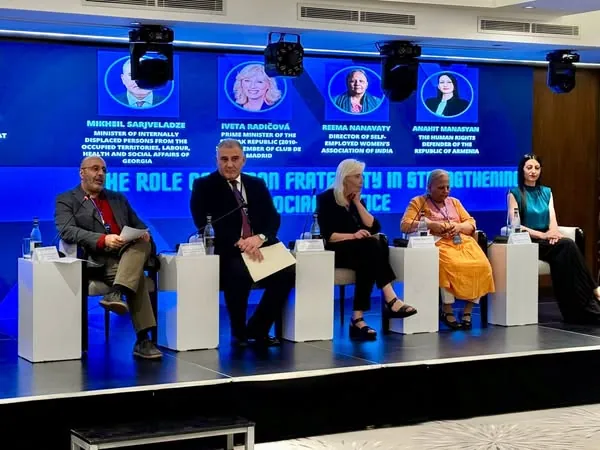The Minister of Refugees, Labor, Health and Social Protection of Georgia from the Occupied Territories Mikheil Sarjveladze, is participating in the 3rd International Conference on Social Justice in Yerevan.
The conference, whose theme is “Unity for Social Justice,” aims to strengthen international partnerships for joint social justice initiatives.
The event is organized by the Armenian Government and the International Labor Organization’s Global Coalition for Social Justice, and it hosts high-ranking officials and experts. Armenian President Vahagn Khachaturian and Armenian Minister of Labor and Social Affairs Narek Mkrtchian opened the conference.
Mikheil Sarjveladze participated in the panel discussion “The role of human unity in social justice” held in the Davos format. The Minister focused on the issues of internally displaced persons, creating a decent living environment for them and promoting integration.
Highlights of the Panel Discussion
The minister noted that the ongoing programs in Georgia include the construction of multi-story residential buildings and the “village house” program. According to him, more than 6,000 apartments will be built for displaced families by 2027.
According to Mikheil Sarjveladze, over the last 10 years, more than 900 million GEL has been spent on housing refugees and this trend will continue in the future.
It is noteworthy that at least 40% of the beneficiaries of the programs are women, which promotes economic inclusion. As citizens of Georgia, refugees are fully integrated into national development strategies, including universal healthcare programs, employment services, and rural development initiatives. Refugees also receive targeted social assistance, tailored to their individual needs.
The panel discussion, also the discussion touched on the employment issues of organized groups. Mikheil Sarjveladze noted that in Georgia, special programs – vocational training, employment services, community work, and social protection mechanisms – are being successfully implemented, which provide equal opportunities for entry into the labor market and support citizens at the regional level so that no group is left behind.



